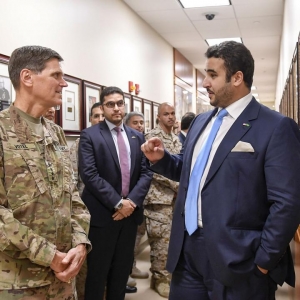
This week, Saudi deputy defense minister Prince Khalid bin Salman will meet with U.S. officials in Washington, the kingdom’s most senior figure to visit since President Biden took office. The thirty-three-year-old son of the king previously served as ambassador to the United States in 2017-2019, then returned to Riyadh to essentially run the Defense Ministry on behalf of his brother Crown Prince Muhammad bin Salman (MbS), who serves as the nominal defense minister and the kingdom’s de facto ruler. A former F-15 pilot with combat experience against the Islamic State and over Yemen, Khalid is now judged to be the crown prince’s most-trusted advisor. A clause in Saudi succession law notionally blocks him from succeeding MbS as next in line to the throne, but he remains the most likely candidate given the young age of the crown prince’s sons.
The end of Khalid’s tenure as ambassador two years ago was clouded by political disquiet over the October 2018 murder of Washington Post columnist Jamal Khashoggi inside the Saudi consulate in Istanbul. Khashoggi had met with Prince Khalid in the kingdom’s Washington embassy before traveling to Turkey. An intelligence report declassified this year concluded that MbS “approved an operation…to capture or kill” the reporter. In marked contrast to the Trump administration, President Biden has dealt directly with the ailing King Salman rather than MbS, whose contact point is Defense Secretary Lloyd Austin.
Additionally, Prince Khalid’s visit takes place after news that the U.S. military would withdraw some missile defenses from the kingdom and other Gulf countries. Extra defense systems were originally deployed there in 2019 after Iranian drones and missiles targeted local oil installations. This April, Riyadh and Tehran initiated direct talks to contain such tensions, which also extend to Houthi rebels in Yemen attacking Saudi targets with Iranian weapons.
When Prince Khalid meets with officials from the State Department, the Pentagon, and the National Security Council (including top advisor Jake Sullivan), the discussions will reportedly focus on the situation in Iraq and Syria, the Yemen war and associated humanitarian crisis, and Israeli-Palestinian issues. It is not clear if he will meet with cabinet-level officials like Austin or Secretary of State Antony Blinken. The Wall Street Journal noted that efforts were being made for him to meet with lawmakers too, but Congress will be in recess during his visit, and members “are reluctant to engage with the Saudis for now, given heightened sensitivities.”
Riyadh’s principal concern is probably Iran and the likelihood of a revived nuclear agreement. The Saudis are likely also upset that Washington has agreed to sell F-35 fighter jets to the United Arab Emirates rather than the kingdom as its first regional customer. Other developments in Saudi-Emirati relations could affect the atmosphere of this week’s talks as well.
For one, Riyadh quietly facilitated last year’s normalization efforts between Israel, the UAE, and Bahrain by allowing overflight rights to passenger aircraft, among other moves probably made in part to appease Washington after the Khashoggi affair. Yet the kingdom has not formally joined the Abraham Accords, apparently because of King Salman’s concerns about the Palestinians and Jerusalem.
More recently, negotiations in the OPEC+ oil cartel collapsed on July 5 because of differences between Saudi Arabia and the UAE. Abu Dhabi wants any increase in its production capabilities to be acknowledged in the calculation of its quota, and is blocking a short-term agreement intended to meet post-COVID demand.
The same day, Riyadh announced that Saudi imports from other Gulf Cooperation Council states would not receive preferential tariff relief if they contain Israeli inputs. This decision may be driven less by ideological factors than by the kingdom’s ambition to become the region’s principal commercial hub. Whatever the case, it will hurt the UAE and its business center in Dubai, while also undermining Israeli trade and investment in the Emirates, a key factor in the normalization process. In short, although Prince Khalid’s visit represents a significant step in reopening the Saudi-U.S. relationship, it is also a reminder of the differences confronting both governments and their regional partners.
